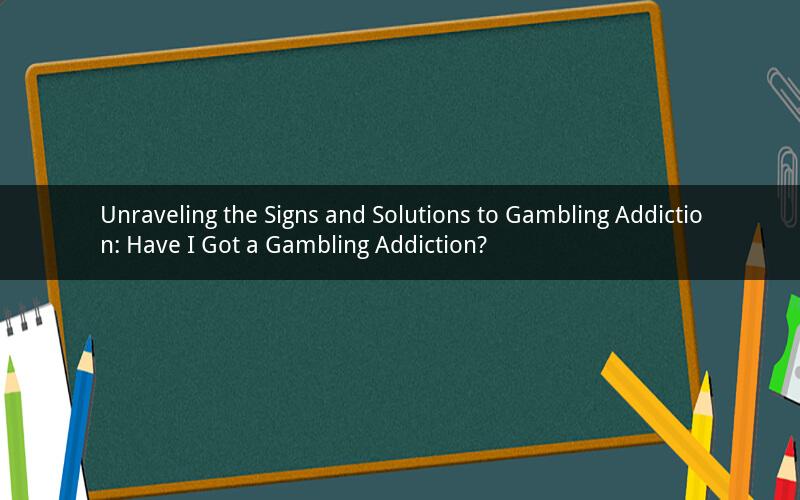
Introduction:
Gambling addiction, often referred to as compulsive gambling, is a serious condition that can have devastating effects on individuals and their families. It is crucial to recognize the signs and seek help if you suspect you or someone you know may have a gambling addiction. In this article, we will explore the signs, consequences, and available solutions to help you determine if you have a gambling addiction.
Signs of a Gambling Addiction:
1. Preoccupation with Gambling:
If you find yourself constantly thinking about gambling, even when you are not engaging in it, it may be a sign of addiction. This preoccupation can manifest as planning your next gambling session, anticipating the thrill, or reliving past experiences.
2. Increased Risk of Financial Problems:
One of the most common signs of a gambling addiction is a growing debt problem. Individuals with a gambling addiction often spend beyond their means, taking out loans or maxing out credit cards to fuel their gambling habits.
3. Ignoring Responsibilities:
Gambling addiction can lead to neglecting personal and professional responsibilities. You may find yourself skipping work or school, neglecting family obligations, or ignoring important tasks to engage in gambling activities.
4. Denial and Rationalization:
Addicts often deny their problem and rationalize their behavior. They may blame others for their financial struggles or justify their gambling as a way to earn money or escape stress.
5. Withdrawal Symptoms:
When a person with a gambling addiction tries to stop or cut back on gambling, they may experience withdrawal symptoms similar to those seen in substance abuse. These symptoms can include irritability, anxiety, and restlessness.
Consequences of a Gambling Addiction:
1. Financial Ruin:
Gambling addiction can lead to significant financial losses, resulting in debt, bankruptcy, and even homelessness. The individual may resort to stealing or other illegal activities to fund their gambling habits.
2. Relationship Damage:
Gambling addiction can strain relationships with family, friends, and loved ones. Trust issues, emotional neglect, and arguments can all arise as a result of the addiction.
3. Mental Health Issues:
Gambling addiction is often associated with mental health problems such as depression, anxiety, and substance abuse disorders. The stress and emotional turmoil caused by the addiction can exacerbate these conditions.
4. Legal Problems:
Individuals with a gambling addiction may face legal consequences due to illegal activities committed to fund their gambling habits. This can include theft, fraud, or even criminal charges.
Solutions to Overcoming a Gambling Addiction:
1. Acknowledgment:
The first step in overcoming a gambling addiction is acknowledging that you have a problem. Admitting to yourself that you need help is a crucial step towards recovery.
2. Seek Professional Help:
A therapist or counselor specializing in gambling addiction can provide guidance and support. They can help you understand the underlying causes of your addiction and develop strategies to overcome it.
3. Support Groups:
Joining a support group, such as Gamblers Anonymous, can provide a sense of community and support. Sharing experiences with others who have faced similar challenges can be incredibly beneficial.
4. Financial Management:
Developing healthy financial habits is essential in overcoming a gambling addiction. Seek help from a financial advisor or credit counselor to create a budget, manage debt, and rebuild financial stability.
5. Relapse Prevention:
Recognize that recovery is a lifelong process. Develop coping strategies to deal with triggers and cravings, and be prepared to seek help if you experience a relapse.
FAQs:
1. What are the risk factors for developing a gambling addiction?
Answer: Risk factors for gambling addiction include a family history of addiction, mental health disorders, impulsivity, and exposure to gambling at an early age.
2. Can a gambling addiction be cured?
Answer: While there is no guaranteed cure for gambling addiction, recovery is possible with proper treatment and support.
3. How can I help someone who has a gambling addiction?
Answer: Encourage them to seek professional help, offer support, and be patient throughout their recovery journey. It is important to set boundaries and protect yourself from financial and emotional harm.
4. Are there any medications to treat gambling addiction?
Answer: There are no specific medications approved for the treatment of gambling addiction. Therapy and support groups are the primary forms of treatment.
5. Can a gambling addiction be prevented?
Answer: While there is no foolproof way to prevent a gambling addiction, being aware of the risks, maintaining healthy financial habits, and seeking help early can reduce the likelihood of developing an addiction.